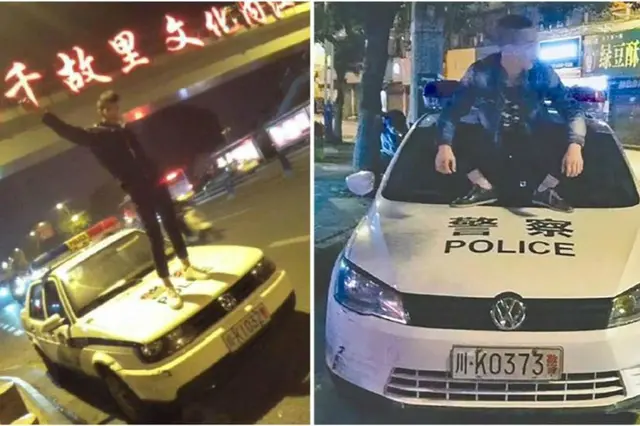As China clamps down on the live-streaming industry, police in an inland city have published photos of two young men arrested for filming themselves damaging police cars and uploading the footage online, accoring to mainland media.
The pair were arrested last month, but police in Neijing, Sichuan province only published the photos on their official website in recent days, the Chengdu Commercial Daily reported.
Police said they had noticed that photos of a young man standing on a police car were circulating on one of the most popular live-streaming sites, Kuai Shou, on November 12. The pranks generated more than 10,000 comments and clicks
They then received complaints about three other similar incidents, with photos showing different people treading on the bonnets of several police cars in the city centre.
One of the suspects was apprehended, along with a friend with a matching hairdo. Photo: SCMP
A day after the police found the photos, they spotted and detained one of the men and a friend at an internet cafe, the report said.
The 16-year-old was quoted as saying that he was “looking for excitement” and trying to gain attention on the livestreaming site. He was then sentenced to 10-day administrative arrest, the report said.
The highly profitable live-streaming industry only emerged in recent years, and went into overdrive last year with tens of thousands of Chinese internet users paying real cash to buy virtual gifts for the their favourite online hosts (who redeem the virtual gifts for the real thing)
But China’s live-streaming industry started to feel the pain this year after the country’s internet regulator imposed stricter registration conditions for live-streaming websites.
The move followed claims that some live-streaming hosts had performed sexually suggestive activities and promoted fake charities that pretended to donate money to remote villages.
All live-streaming hosts must now register under their real names, backed by identity documents, according to a decree issued by the Ministry of Culture on Tuesday.
(SOUTH CHINA MORNING POST)
 简体中文
简体中文

